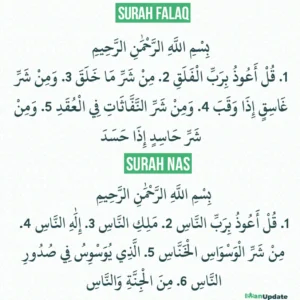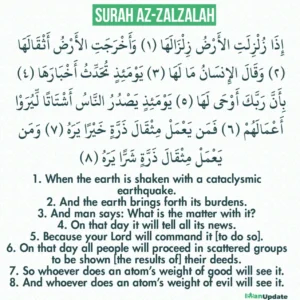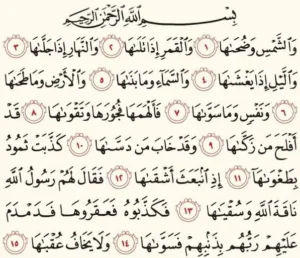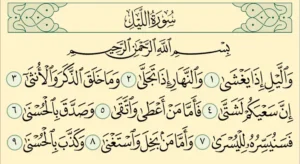Surah Wattini Wazzaitun in English, Arabic & Transliteration
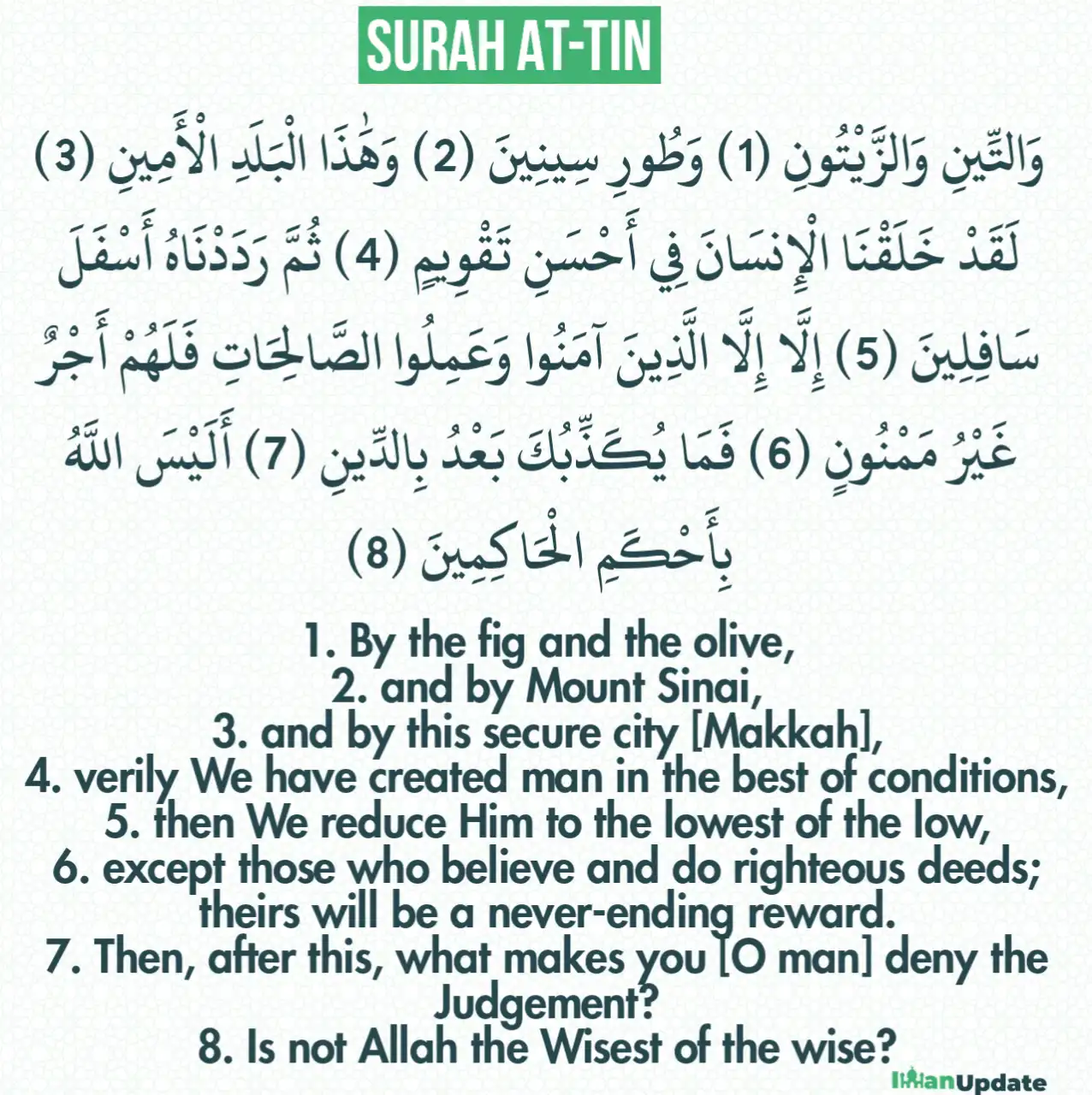
Surah At-Tin (Surah wattini wazzaitun) is a thought-provoking chapter in the Quran, named after the fig mentioned in its first verse. This surah delves into the remarkable creation of humanity, underscoring the profound wisdom and purpose behind it.
Surah Wattini Wazzaitun in Arabic
بِسْمِ اللَّهِ الرَّحْمَٰنِ الرَّحِيمِ
وَٱلتِّينِ وَٱلزَّيۡتُونِ (1) وَطُورِ سِينِينَ (2) وَهَٰذَا ٱلۡبَلَدِ ٱلۡأَمِينِ (3) لَقَدۡ خَلَقۡنَا ٱلۡإِنسَٰنَ فِيٓ أَحۡسَنِ تَقۡوِيمٖ (4) ثُمَّ رَدَدۡنَٰهُ أَسۡفَلَ سَٰفِلِينَ (5) إِلَّا ٱلَّذِينَ ءَامَنُواْ وَعَمِلُواْ ٱلصَّٰلِحَٰتِ فَلَهُمۡ أَجۡرٌ غَيۡرُ مَمۡنُونٖ (6) فَمَا يُكَذِّبُكَ بَعۡدُ بِٱلدِّينِ (7) أَلَيۡسَ ٱللَّهُ بِأَحۡكَمِ ٱلۡحَٰكِمِينَ (8)
Wattini Wazzaitun Surah Transliteration
- Wat teeni waz zaitoon
- Wa toori sineen
- Wa haazal balad-il ameen
- Laqad khalaqnal insaana fee ahsani taqweem
- Thumma ra dad naahu asfala saafileen
- Ill-lal lazeena aamanoo wa ‘amilus saalihaati; falahum ajrun ghairu mamnoon
- Fama yu kaz zibuka b’adu bid deen
- Alai sal laahu bi-ahkamil haakimeen
Surah Wattini Wazzaitun in English
- By the fig and the olive,
- and by Mount Sinai,
- and by this secure city [Makkah],
- verily We have created man in the best of conditions,
- then We reduce Him to the lowest of the low,
- except those who believe and do righteous deeds; theirs will be a never-ending reward.
- Then, after this, what makes you [O man] deny the Judgement?
- Is not Allah the Wisest of the wise?
READ ALSO: Al Kariyatu Mal Kariya Surah in English, Arabic & Transliteration
Summary Of Wattini Wazzaitun Surah
| Name in English | The Fig Tree, The Fig |
| Name in Arabic | ٱلتِّين |
| Verses | 8 |
| Position in Quran | 95th Surah |
| Classification | Meccan |
| Surah Before | Surah Ash-Sharh (94) |
| Surah After | Surah Al-Alaq (96) |
| Theme | A fundamental moral verity, common to all true religious teachings. |
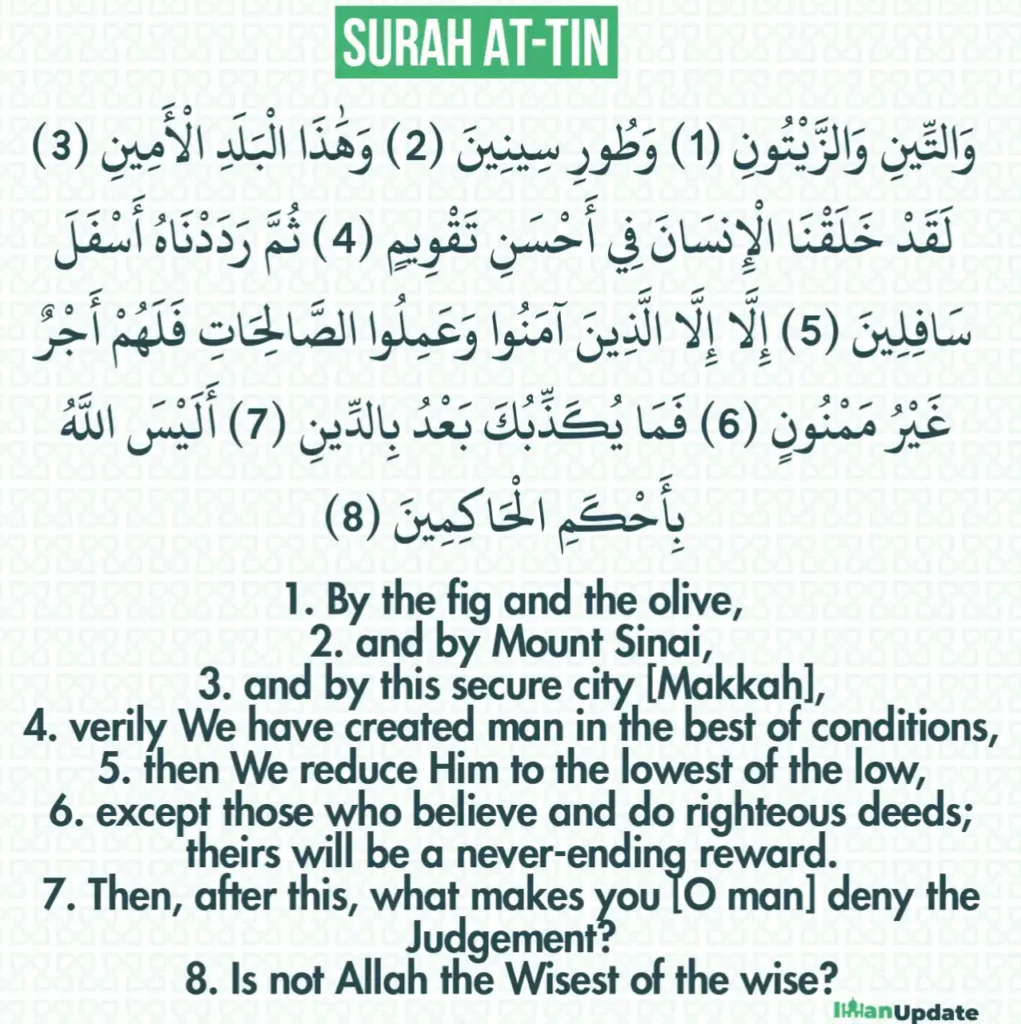
This eight-verse surah, revealed in Makkah, takes its title from the first word “at-Teen,” meaning fig.
Allah swears by four significant entities: the fig, the olive, Mount Sinai, and the Safe Land (Makkah), emphasizing the creation of humanity in the finest form.
The fig and olive represent wholesome, health-giving fruits, while Mount Sinai is the site of Allah’s conversation with Prophet Musa.
Allah highlights the creation of man in the best image, but warns that disobedience will lead to the lowest depths of Hellfire.
In contrast, believers who follow Allah’s guidance will receive an endless reward. Some scholars interpret “the lowest of the low” as old age, emphasizing the potential decline of human dignity.
The surah concludes by questioning the denial of the Final Judgment, acknowledging that earthly justice may be imperfect.
However, Allah, the Best of Judges, will establish absolute justice on the Day of Judgment, rewarding the good and punishing the evil, ensuring perfect accountability.
Allah swears by the fig and olive trees, renowned for their benefits and prevalence in the prophetic lands of ash-Sham, and by Mount Sinai and Makkah, sacred sites of prophethood.
This oath underscores the significance of these chosen locations and the noble prophets who emerged from them.
Allah attests to creating humans in the best conditions, with proportionate limbs and upright stance, lacking nothing essential.
Yet, despite these blessings, most people fail to show gratitude, distracted by trivial pursuits.
As a result, they will be reduced to the lowest depths of hell, except for those blessed with faith, righteous deeds, and a noble attitude, who will receive an endless, ever-available reward in eternal bliss.
The surah questions humanity’s denial of the Judgment, despite witnessing Allah’s signs and blessings.
It emphasizes Allah’s wisdom, questioning whether He would leave humans without purpose, commands, or consequences.
The Creator, who bestowed numerous blessings and favors, will inevitably guide humans to their ultimate destination, where they will face reckoning.

